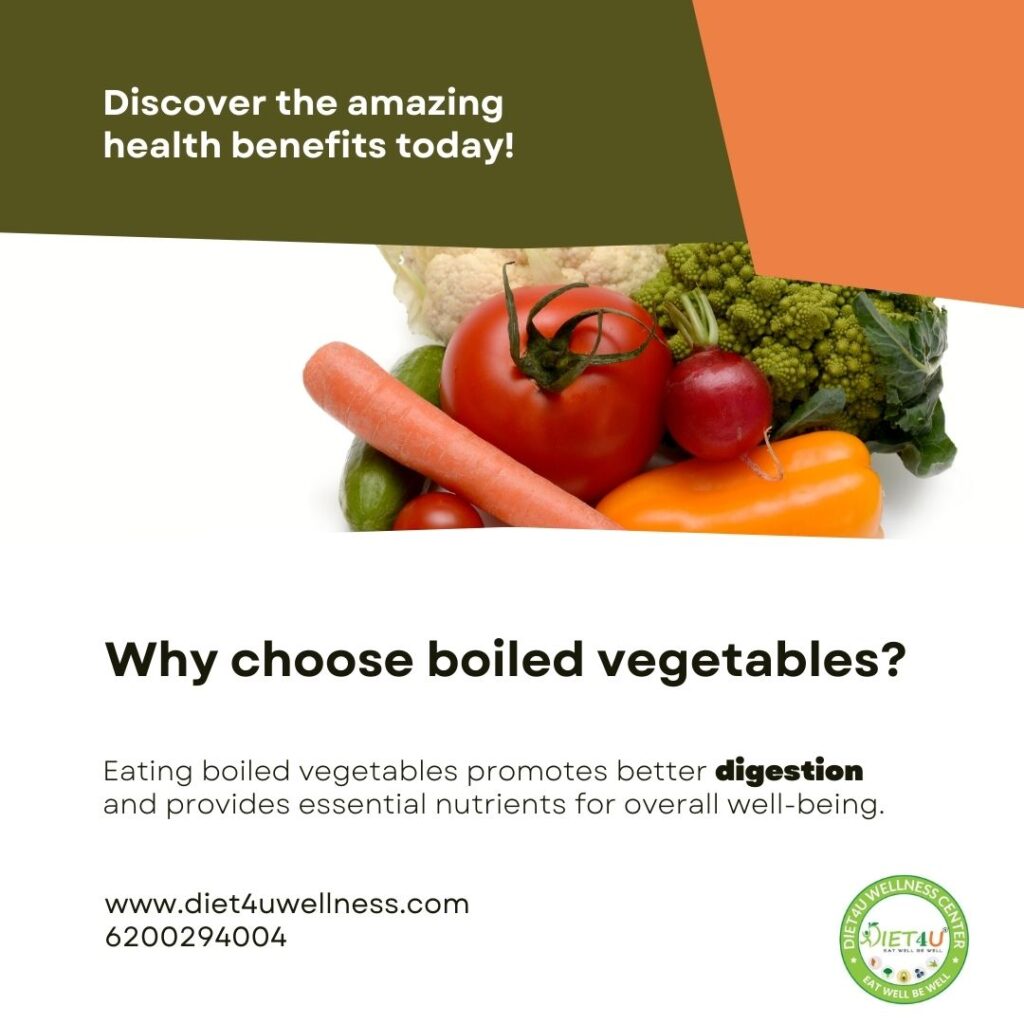
Top Benefits of Eating Boiled Vegetables: A Healthy Choice
Eating boiled vegetables has multiple benefits, which are listed in this article by DIET4UWELLNESS.
Easy to Digest
Boiled vegetables lack other spices and chemicals, making them more accessible for the gut to digest. The high temperature during boiling makes the vegetables softer and breaks down the fibres, making them easier to digest than raw vegetables. Therefore, this is one of the most significant benefits of eating boiled vegetables.
High Hydration
Boiled vegetables play a huge role in adding hydration (water) to the system, as they absorb water while cooking. Hence, it is beneficial to consume boiled vegetables.
Nutrient Retention
Boiled vegetables are simply prepared by boiling them with salt to taste without any addition of other flavourings or chemicals that might interfere with the nutrient content of the vegetables. Boiling can thus help retain all the essential vitamins and minerals, making them healthier for one’s consumption. Vitamins B and C are water-soluble, and these are preserved in the vegetables if boiled instead of baking or frying.
Enhanced Flavour
Even though this is a relative thing, boiling vegetables enhances the flavour as there is no involvement of other flavourings, seasonings, or spices.
Easy to prepare
Boiling is a quicker option, as compared to baking or frying food items. Also, it’s a healthier option than frying and could be a substitute for ordering readily available fast food. It is very convenient to cut a few vegetables and boil them with some salt in water and have them; it is a fast and healthy option. It’s even cheaper than ordering fast food over food delivery apps. The simplicity of fast food makes it an excellent choice for those who cannot cook or when one is in a hurry. Eating boiled food is beneficial as it helps one maintain a balanced diet.
Prevents formation of Kidney Stones
Boiling food helps remove many oxalates, which are the major kidney stone-causing compounds. Consuming boiled vegetables leads to an intake of much lesser oxalates, hence reducing the chances of kidney stones. Therefore, people who are genetically or hereditarily prone to kidney diseases should consider including meals with boiled vegetables.
Helps prevent Acidity
Boiled foods are easy to chew and digest and thus assimilate in the body. Therefore, it makes it easier to digest cooked vegetables. As boiled vegetables are softer, the stomach doesn’t need much acid to be produced to break the food down. Hence, there is a very faint possibility of making extra gastric acid in the stomach and, in turn, getting stomach aches and ulcers. Therefore, it is beneficial to eat boiled vegetables daily.
Keeps skin Healthy
Boiling vegetables is a better option than other cooking methods. Boiling food retains much more nutrients than fried or baked food, which are lacking in people’s diets these days due to the prevalence of unhealthy fast food. When the body stays healthy from the inside, it is visible from the outside and in the skin. Thus, regular consumption of boiled vegetables would help maintain healthy skin.
Availability of Antioxidants
Boiling vegetables increases the availability of antioxidants, which are essential for maintaining a healthy lifestyle. Antioxidants help neutralize free radicals, which are produced as a metabolic by-product in the body. When vegetables are cooked, the availability of antioxidants decreases; therefore, consuming boiled vegetables is a better option.
Delicious Recipes and Benefits of Eating Boiled Vegetables
Boiled Potatoes with Garlic and Mixed Herbs

Ingredients:
One small-medium sized potato
One tablespoon of olive oil
3-4 cloves of fresh garlic
One tablespoon of chopped rosemary
Salt and pepper as per taste
Instructions
The potatoes are peeled, washed, and boiled in water with a pinch of salt.
The potatoes are boiled for 15-20 minutes until they become soft.
The water is drained from the boiled potatoes and then cooled.
The boiled potatoes were then mashed with garlic, rosemary and salt-pepper being added.
Boiled Brussel Sprouts

Ingredients:
One small-sized potato
One small onion chopped
One tablespoon of olive oil
One bowl of Brussels sprouts washed and boiled
The chopped vegetables are mixed with boiled Brussels sprouts.
Finally, one tablespoon of lemon juice is squeezed as a garnishing.
Instructions
The potatoes are boiled and mashed into a smooth consistency.
One onion is taken and chopped, along with garlic and fresh coriander
The boiled Brussels sprouts are mixed with the other cut vegetables.
FAQs Related to Benefits Of Eating Boiled Vegetables
Do boiling of vegetables lose nutrients?
Boiling will lead to the loss of some nutrients, especially water-soluble vitamins like Vitamin C. But, it is also true that other cooking methods like baking, frying, etc. The loss of vitamins can be tackled by using minimal water for boiling. Therefore, even though it loses some nutrients, eating cooked vegetables has ample other benefits.
How long the vegetables should be boiled?
The duration for boiling vegetables varies from one vegetable to the other.
Leafy green vegetables like spinach, kale, & cabbage don’t need long hours of boiling. Approximately 2-5 minutes is enough.
Vegetables like carrots, which have underground roots and stems, need a bit longer, like 10 minutes or more.
The time needed to boil is almost negligible, and the benefits of consuming boiled vegetables can outweigh the time required to cook them.
Are boiled vegetables good for weight loss?
Yes, it is one of the best meals for weight loss. The benefits of eating boiled vegetables have already been listed in this article by DIET4UWELLNESS. The cooked vegetables contain dietary fibres, which would lead to the maintenance of bowel health. Also, boiled vegetables don’t contain other preservatives and chemicals. Therefore, they wouldn’t interfere with any other prevalent health conditions. It would include all the necessary nutrients & minerals to help maintain a healthy weight & prevent the consumption of unhealthy fats.
Which is healthier? Boiling or Steaming?
Steaming is considered a better option than boiling. Boiling requires longer durations of time, so the nutrient loss is more significant in the case of cooking than in the case of steaming. The benefits of eating boiled vegetables are almost the same as those of steamed vegetables, so either can be opted for. However, one can consult a board-certified dietician like Dt. Rukhsana Azhar will choose what would be best for the concerned person.
Can boiling vegetables help remove pesticides?
Boiling can indeed reduce the pesticide content, but not entirely. It is better to wash the vegetables in simple water or scrub them with baking soda to get rid of pesticides and other chemicals.
Are there any disadvantages to eating boiled vegetables?
The benefits of boiling vegetables have already been listed in this article by DIET4UWELLNESS; however, there are a few disadvantages, too, which are mentioned here.
- Most people are most concerned about nutrient loss. However, the benefits of consuming boiled vegetables outweigh the disadvantages of minimal nutrient loss.
- Mushy texture: After boiling the vegetables, their texture doesn’t stay as fresh and crisp. Rather, it becomes mushy and soft, which could be less appetizing to a huge demographic of society. However, one should acknowledge the numerous benefits of eating boiled vegetables and not pay much heed to the texture.
Some people also find the flavour and smell of boiled vegetables quite off-putting. However, if proper seasoning and salad dressing are used, everyone might like them and consume them, considering the benefits of boiled vegetables.

Hello My Name is Dt. Ruksana Azhar and I am a certified dietician and providing online & offline services for Weight Management, PCOS/PCOD Management, Diabetes Management , etc. I have 12+ years of experience in the Apollo Hospital Delhi , Max Super Specialty Hospital Delhi, Lilavati Hospital Mumbai and VLCC healthcare Mumbai. I loves to write healthcare and lifestyle related blog. My favorite part of being a doctor is the opportunity to directly improve the health and wellbeing of my patients and to develop professional and personal relationships with them.



